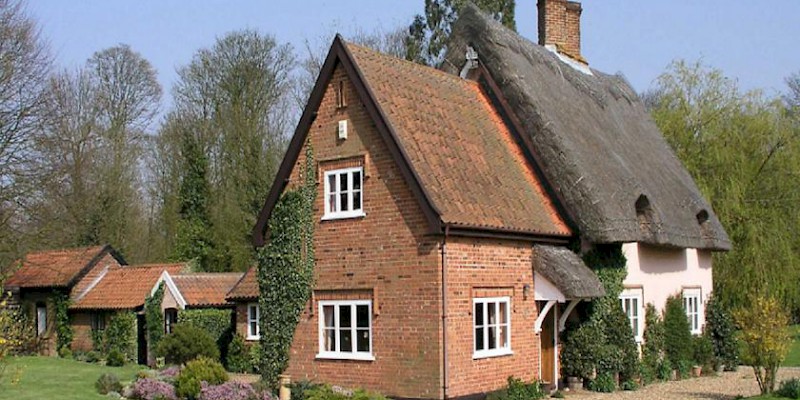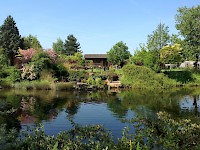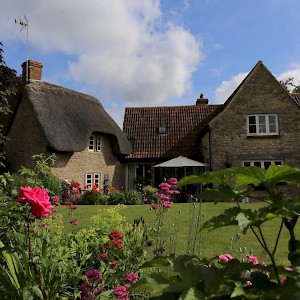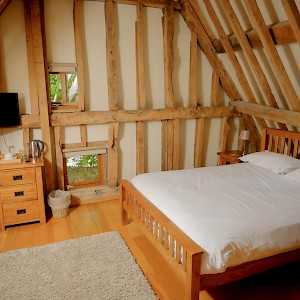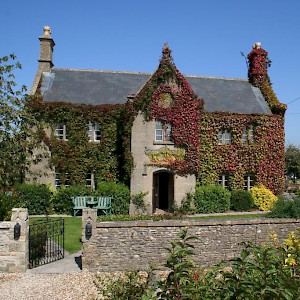Farm stays and agritourism ★★★
Stay on a working farm and experience the best of British hospitality and countryside tradition
Farm stay operations in Great Britain can range from £85 (including a Full English breakfast) for a room under a thatched roof with free WiFi at the aptly-named Thatched Farm in Suffolk, England, to the Shenval B&B organic farm in the Scottish Highlands near Loch Ness charging £58–£70 for a double; £90–£105 for a cozy guest room and a full English breakfast at North Farmcote Bed & Breakfast in the Cotswolds, to £100 per double at the Reddivallen Farmhouse, a stone cottage on an organic beef farm in Cornwall, not far from Tintagel, a.k.a. Camelot.
Even if you can't afford your own farmhouse in the English or Scottish countryside, staying on a working farm, or agritourism, gets you up close with the rural heart of a destination.
You don’t even have to milk the buffalo for mozzarella or stomp the grapes for wine (though sometimes being a temporary farm hand for fun is an option).
How much does a farm stay in the U.K. cost?
Many U.K. farms charge between £45 and £120 per night for a B&B arrangement. Fancier places may charge more.
A self-catering cottage on a farm in the English Lake District or Scottish Isle (or anywhere else) starts around £225–£400 per week.
What a British farm stay is like
The concept behind agritourism (or rural tourism, or farm stays, or farmhouse B&Bs, or whatever you want to call it) is simple: you spend the night as a guest on a working farm. From there, though, the concept flies off in many directions.
Sometimes you just hole up for the night in a B&B converted from a farmhouse.
Sometimes you actually stick around to do volunteer work for a few days (a week, two months, a year), as with the WWOOF and Helpx networks.
Sometimes, just renting a cottage in a rural area where sheep wander past your window is enough to count.
Ideally, the property's owners live on-site and are farmers who derive the bulk of their income from agriculture, using this newfangled form of tourism merely to help make ends meet.
I've stayed at loads of farms in Europe: vineyards and dairy farms, barns amid olive groves and frescoed villas next to horse stables.
Each stay has offered me a different experience of farm life for a fraction the cost of a hotel.
Many agritourisms require a three-night minimum stay (for some, a week).
Roughly half accept credit cards.
Sometimes you get four-star luxury and satellite TV. Sometimes you’re a straw's-width from sleeping in a stall.
Most, though, are just what you'd expect from a farmhouse B&B: simple comforts, solid country furnishings, and rural tranquility—barnyard noises excepted.
The hosts tend to be a sight friendlier than your average hotel desk clerk. Some invite guests to dine with them, family-style, in the farmhouse. One shepherd (in Italy) let me stir a bubbling pot of sheep's milk to help it on its way to becoming pecorino cheese. Vineyard owners love to crack open bottles of their best to guide you through the finer points of wine tasting.
Breakfast is usually awesome: farm-fresh and farmer-hearty.
Finding the perfect British farm stay
As usual, the best resource is usually the local tourist office, which almost always keeps a complete list of all agritourism and farm stays in the area—and, in the best cases, includes that list on its website with links.
That said, below are links and resources to help you find farm stays across the U.K.
Top farm stays
- Farmstay.co.uk - A not-for-profit, farmer-owned umbrella group for local farmstay and agritourism associations that lists nearly 1,000 rural accommodation options—farmhouse B&Bs, self-catering rural cottages, campgrounds, caravans, and rural hostels—across England, Scotland, Wales, and Northern Ireland.
- Organicholidays.com - B&Bs, rental cottages, camping slites, or homestays all on working organic farms—including about 200 in England, 47 in Scotland, 73 in Wales, and 1 in Northern Ireland.
- Booking.com - The general booking site lists around 90 farm stays, the luxury tents, and more than 520 "Country House" lodgings across the United Kingdom.Partner
- Featherdown.co.uk - An intriguing glamping ("glamourous camping") experience in wood-floored, cottage-like, multi-room "tents"—think of a higher-end safari tent, only with a rustic-ramshackle British decor—that sleep up to six with all the comforts of a (modest) country home. There around 33 across around England, Scotland, and Wales. Very hobbity. From around £100 per night for three-night midweek stays (higher on weekends).
- Wwoof.net - If you really want to get your hands dirty, sign up to become a temporary farmhand through this volunteer organization. Gigs last from a few weeks to a few months, and while you pay (a mdoest sum) to join, room and board is free in exchange for your work.
- Helpx.net - Similar to Wwoof, but with more varied opportuniites, Helpx is another place where you can volunteer your services—as a farmhand, handyman, or other skill—in exchange for room and (sometimes) board on farms, B&Bs, hostels, and boats. Gigs can last from a few weeks to a few months.
Tips
Those of us trapped in the cities, suburbias, and endless mallscapes of the so-called "developed" world are increasingly seeking out the simple pleasures of the farm life on vacation.
(Farmers: we call them "simple pleasures" because we don't actually have to get up at 4am to do back-breaking work all day only to watch some natural disaster, commodities market crisis, or simple bad weather whither the annual yield.)
Why?
Well, if there's one thing that connects and binds all human beings, across cultures and languages, races and religions, it’s agriculture.
That might sound funny coming from a guy who lived most of his life in Philly and New York City—who’s being read by folks squinting at glowing computer terminals—but think about it.
Conventional wisdom holds that humanity as a collective culture began when our distant ancestors settled down in the fertile Tigris/Euphrates river valley and began cultivating the land and domesticating the more docile of the meat-on-the-hoof creatures handy.
Our very existence as a social species with an advanced culture and ever more inventive tool-making capabilities (behold: the iPhone) has its roots sunk deep in the rich soil of agricultural pursuits.
There's a reason that farms in Europe are so heavily subsidized and America's amber waves of grain are immortalized in song. Agriculture is more than just a food source.
Somewhere, deep down, we all realize that to lose our farmers would mean to lose something fundamental about our very way of life—even if all we do all day is sit inside the fat trunks of the glass-and-steel trees that forest our postmodern concrete jungles and tap away endlessly at computer keyboards.
Perhaps it's that very disconnect from our species' fundamental mode of survival and community life—sit still, plant food, raise livestock, be friendly to the neighbors—which is driving the development of the agritourism movement.

